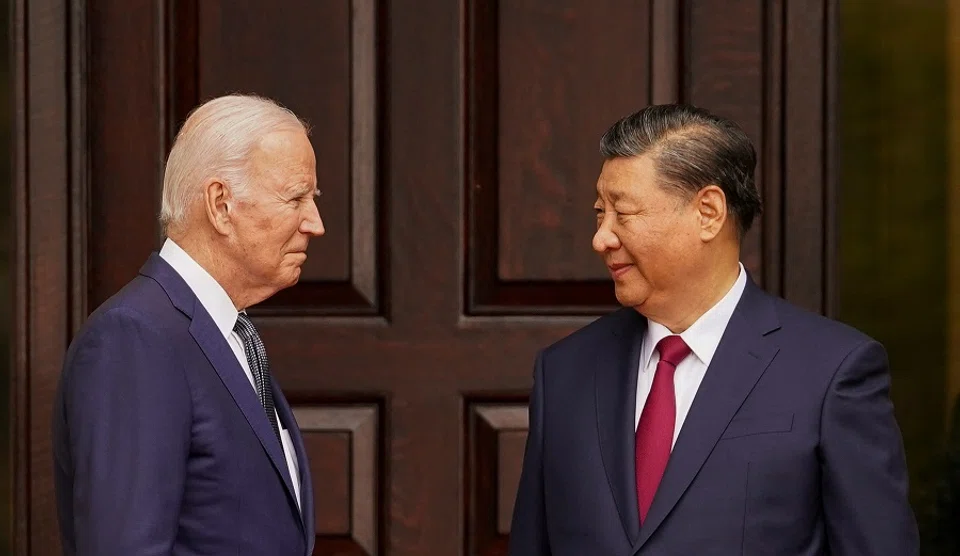Xi-Biden meeting ends on positive note: A better tomorrow?
The meeting between Chinese President Xi Jinping and US President Joe Biden concluded on an upbeat note, with many issues discussed albeit with no real consensus at the moment. However, this opens the door to future dialogue and communication between both sides.

Following nearly a year of shaky bilateral relations, the China-US leaders' summit ended on a positive note. While there were no breakthroughs on strategic issues such as trade, the Taiwan Strait or rivalry between both countries, the leaders announced the establishment of a working group to combat fentanyl and an intergovernmental dialogue on artificial intelligence, while high-level military communications, most valued by the US, will also be restored.
The Xi-Biden summit took place on 15 November local time at the Filoli estate in San Francisco. After four hours of talks via simultaneous interpretation, lunch and a garden stroll, China and the US affirmed the effectiveness of the meeting and pledged to continue communicating with each other. This is also in line with the hope that China-US relations will stop spiralling and stabilise.
However, the blunt and candid exchanges also made clearer the existing differences between both major powers. There was still no consensus on core strategic issues, including Chinese priorities such as the positioning of bilateral relations and China's right to development, as well as US priorities such as the issues involving the Taiwan Strait, human rights and the South China Sea.
Statements from US and China
According to the White House's readout, US President Joe Biden emphasised that China and the US are "in competition", stressing to Chinese President Xi Jinping that the US will "continue to invest in the sources of American strength at home and align with allies and partners around the world". The US will also continue to safeguard its interests and values, and stressed that its commitment to defending its Indo-Pacific allies remains "ironclad", while reaffirming its enduring commitment to freedom of navigation and maintaining peace and stability in the South China Sea and East China Sea. However, Biden also reiterated that "the world expects the United States and China to manage competition responsibly to prevent it from veering into conflict, confrontation, or a new Cold War".
... the earth is big enough for both countries to succeed, and that one country's success is an opportunity for the other. - Chinese President Xi Jinping

On the other hand, Xi opened by saying, "I am still of the view that major-country competition is not the prevailing trend of current times." He stressed that the earth is big enough for both countries to succeed, and that one country's success is an opportunity for the other. As long as the countries find the right way to get along, Xi "firmly believes in the promising future of the bilateral relationship".
According to a statement released by China's foreign ministry, Xi stressed that China has "no plan to surpass or unseat the United States" and so the US "should not scheme to suppress and contain China".
Key issues
Both sides also maintained their confrontational stance on key specific issues. Xi reiterated that the Taiwan issue remains "the most important and most sensitive" issue in China-US relations, and asked the US to take real action to honour its commitment of not supporting "Taiwan independence", and to stop arming Taiwan.
Xi also criticised the US's actions against China in terms of export control, investment screening and unilateral sanctions, and asserted that stifling China's technological progress equates to containing China's high-quality development and depriving the Chinese people of their right to development. He noted that China's development and growth is driven by its own inherent logic, and will not be stopped by external forces.
... the US will continue to take necessary actions to prevent advanced US technologies from being used to undermine the country's own national security... - US President Joe Biden

On his part, Biden raised concerns regarding China's human rights abuses in Xinjiang, Tibet, and Hong Kong. He reiterated that the US's "one China policy has not changed" and that it opposes any unilateral changes to the status quo from either side, whilst calling for restraint in China's use of military activity in and around the Taiwan Strait.
Biden also raised continued concerns about China's "unfair trade policies", non-market economic practices, and punitive actions against American firms. He said that the US will continue to take necessary actions to prevent advanced US technologies from being used to undermine the country's own national security, without unduly limiting trade and investment.
Other topics of interest
The US also raised the subject of American citizens who have been detained or subjected to exit bans in China. At a press conference after the Xi-Biden meeting, Biden revealed that he provided the names of individuals that the US thinks are being held, in the hope of securing their release, but no agreement was reached.
Amid tense China-US relations, both heads of state could be accused of "showing weakness" as they attempt to repair bilateral relations, especially Biden, who is under pressure to be re-elected. However, US public opinion is more focused on the situation in the Middle East at the moment, and the focus on US-China relations is relatively weaker. At the press conference about the Xi-Biden summit, nearly half the questions that Biden received were related to the Israel-Hamas conflict.
... mutual animosity has been extremely damaging in both the US and China, and that the Xi-Biden meeting was an effort to break this vicious cycle... - Professor Ang Yuen Yuen, Johns Hopkins University

It is clear from many small details that the White House went to great lengths to ensure the meeting's success and to maximise the effectiveness of small goodwill gestures. For example, Biden found a photograph of a young Xi Jinping visiting the Golden Gate Bridge, and extended birthday greetings to Xi's wife Peng Liyuan.
Ang Yuen Yuen, a professor at Johns Hopkins University, told Lianhe Zaobao that as Xi enters his third term in office, he needs to improve China-US relations to stabilise the economy. At the same time, while there is a bipartisan consensus in the US on being vigilant toward China, the Biden administration does not want its position to be defined by anti-China views, but this has triggered both domestic and international backlash.
She thinks that mutual animosity has been extremely damaging in both the US and China, and that the Xi-Biden meeting was an effort to break this vicious cycle through a "candid" (Biden's words) exchange at the highest level. She added, "Let's hope that this positive momentum can be maintained."
"Both sides have not addressed, much less resolved, major areas of geopolitical contention." - Professor Orville Schell, Asia Society
Reactions from academics
Academics interviewed analysed that the momentum for China-US dialogue has been rekindled, and should prevent any further worsening of relations; but some also pointed out that China and the US did not address major areas of geopolitical contention.
In an interview with Lianhe Zaobao, Professor Zhu Feng, executive director of the China Centre for Collaborative Studies of the South China Sea at Nanjing University, assessed that the San Francisco meeting showed that China-US relations have stabilised, and the situation is now more positive.

When interviewed, Professor Orville Schell, Arthur Ross director of Asia Society's Center on US-China Relations, described the general mood of the meeting as "civil but hardly exuberant", adding that both sides can cooperate in some areas where there are common interests, which will somewhat stabilise US-China relations.
However, Schell also pointed out that "both sides have not addressed, much less resolved, major areas of geopolitical contention."
In the meeting, both leaders agreed on cross-border anti-drug cooperation, resumption of military dialogue and exchanges on artificial intelligence safety issues, but did not reach a consensus on hot button issues such as tariffs and the tech war.
No fundamental change in policy
Schell said the cooperation between the countries in areas such as anti-drug issues does not necessarily mean that the often very hostile relationship between the US and China will be fundamentally altered.
...the framework of US policy towards China would not be fundamentally changed or altered. - Professor Zhu Feng, Nanjing University
Bonnie Glaser, director of the Asia programme at US think tank German Marshall Fund, said when interviewed: "The US and China are locked in a strategic competition that is likely to last for many years. There are likely to be ups and downs, and perhaps we are entering a period of greater predictability, though it is uncertain how long it will last."

Biden and Xi last met in person in November 2022 on the sidelines of a meeting in Bali, Indonesia, which at one point improved external observers' predictions about worsening China-US relations. Many analyses had it that China and the US would be able to move past the shroud cast over bilateral relations following then US House Speaker Nancy Pelosi's visit to Taiwan, but relations hit a low point less than three months later due to the balloon incident.
Amid the ups and downs of China-US relations, external observers generally held relatively low expectations of the meeting between Xi and Biden.
Zhu felt that the chances of another rapid dip in China-US relations in the short term are low. At the meeting in Bali, dialogue mechanisms across different fields, especially high-level communication, did not resume, but this time around, the momentum for dialogue between China and the US has been rekindled. "It would not be easy to rapidly improve relations, but both sides should be able to avoid a situation whereby relations deteriorate rapidly."
At the same time, Zhu noted that the framework of US policy towards China would not be fundamentally changed or altered. China hopes to push the US into redefining relations between the two sides from a strategic perspective, but Biden remains more focused on the direction of concrete issues, such as not supporting Taiwan independence and a willingness to maintain cooperation with China. Hence, there remained disagreements, contentions and some degree of antagonism between the two nations in this meeting.
Future possibilities
With regard to whether the recent meeting would be able to stem the trend of a downward spiralling of China-US relations, Johns Hopkins University professor Ang Yuen Yuen said when interviewed that both sides accept that competition is here to stay, but they share a common interest in stabilising the relationship.
China-US relations are now in what might be considered the "Age of Ambiguity", and the US is still learning how to cope with such ambiguity. - Ang

Ang pointed out that US leaders face a steep learning curve, because there is no precedent for an interdependent competitor like China. Both the US and China are participants of a global capitalist system, rather than a clear-cut opposite of socialism against capitalism like in the old Cold War. China-US relations are now in what might be considered the "Age of Ambiguity", and the US is still learning how to cope with such ambiguity.
However, Ang felt that a gesture of willingness among the two nations' highest leaders to improve and stabilise the relationship is itself a big accomplishment, adding that their gesture will set a warmer tone for the rest of the administration, and it could even percolate down to society.
This article was first published in Lianhe Zaobao as "习拜会在积极氛围中落幕 中美军事沟通机制全面恢复" and "中美对话势头重建 应可避免关系再次迅速下滑".




![[Photos] Fact versus fiction: The portrayal of WWII anti-Japanese martyrs in Taiwan](https://cassette.sphdigital.com.sg/image/thinkchina/3494f8bd481870f7c65b881fd21a3fd733f573f23232376e39c532a2c7593cbc)

